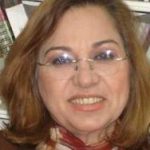The Caravan - November 19, 2006
The renowned author and journalist Ikbal Baraka targeted gender discrimination in Islam in her lecture at the American University in Cairo (AUC) on Nov 9.
The title of the lecture, “the Muslim woman in the struggle between the tarbush and the hat,” came from one of her novels. The lecture, as most of her works do, focused on correcting the status of women in Islam, which she said is currently influenced by an inaccurate representation of the Quran and the Sunna, or practices of the Prophet Muhammad.
In her interview with the Caravan, Baraka vowed to fight for the women’s rights in Islam as long as she lives.
“I feel that I am responsible to spread my word,” said Baraka.
Baraka is currently the editor-in-chief of Hawaa magazine, an Egyptian publication that focuses on issues facing women. She is also a columnist, scriptwriter, and novelist. In addition, she has intensively studied the subject of women in Islam in the Quran and hadith, or sayings of the Prophet Muhammed, at Cairo University.
“She is one of the foremost journalists, writers and thinkers in Egypt,” said Mona Mikhail, a visiting professor in the Arabic Studies department, who helped organize the lecture. She described Baraka as a researcher who is “very well informed in the areas that she touches upon, namely, the role of women in society.”
Baraka’s knowledge of women in Islam led her to write several books on the subject, including A New Look on Hijab, The Muslim Woman in the Struggle Between the Tarbush and the Hat, and her latest book, The Hijab.
In her analysis of the modern status of women in Islam, Baraka said that the discrimination against women is the main reason that Egypt is falling so far behind other countries.
Baraka graduated with a degree in English literature from the Faculty of Arts of Alexandria University in 1962 and later received a degree in Arabic literature from Cairo University in 1979.
According to Baraka, her years studying English literature in Alexandria greatly influenced her work, especially the writings of Virginia Woolf. She also praised the Islamic poet, Al Mutanabi, and said that his poems, philosophies and style of writing made him one of her favorite writers.
Baraka’s fascination with literature began at an early age when she regularly visited the public library near her primary school. She described her discovery of its children’s books section as “finding Ali Baba’s treasure.”
She explained that her literary talents were first recognized in high school and credited her Arabic and English teachers, who “were the ones who pushed me forward and encouraged me,” she said.
“I believe that I inherited [the gift of the Arabic language] from my father. He is fond of reading and has a beautiful style in Arabic writing,” said Baraka, who explained that she inherited her strong command of the language from him as well as from her grandfather, who was an Al Azhar graduate and Arabic teacher.
Students who attended her lecture described her as an open-minded and charismatic speaker.
“I don’t think people open up to her views. They are different and people are always ready to attack,” said May Sabry, a biology senior who attended the lecture.
“She is a very successful writer and a feminist in her views,” added Mohamed Birairi, a visiting professor in the Arabic Studies department, who had urged his students to attend the lecture.
.
Asma Alsharif interviews Ikbal Baraka
Renowned writer fights for women's rights in Islam
By: Ekbal Baraka - on: Monday 1 January 2007 - Genre: Interviews
Upcoming Events

Arabia Felix - Alarabia Alsaida in Bayt Yakan
April 15, 2025
Arabia Felix by Thorkild Hansen, and translated by...

A writer, a vision, a journey: a conversation with Professor Ilan Pappe
March 15, 2025
This event took place on 15 March, 2025 . You may...

مسافر يبحث عن ماء
February 17, 2025
تقيم نقابة اتحاد كتاب مصرشعبة أدب الرحلات تحت رعاي...

Online discussion of The Vegetarian by Han Kang Nobel Prize winner 2024
November 08, 2024
This discussion of Han Kang’s The Vegetarian...
